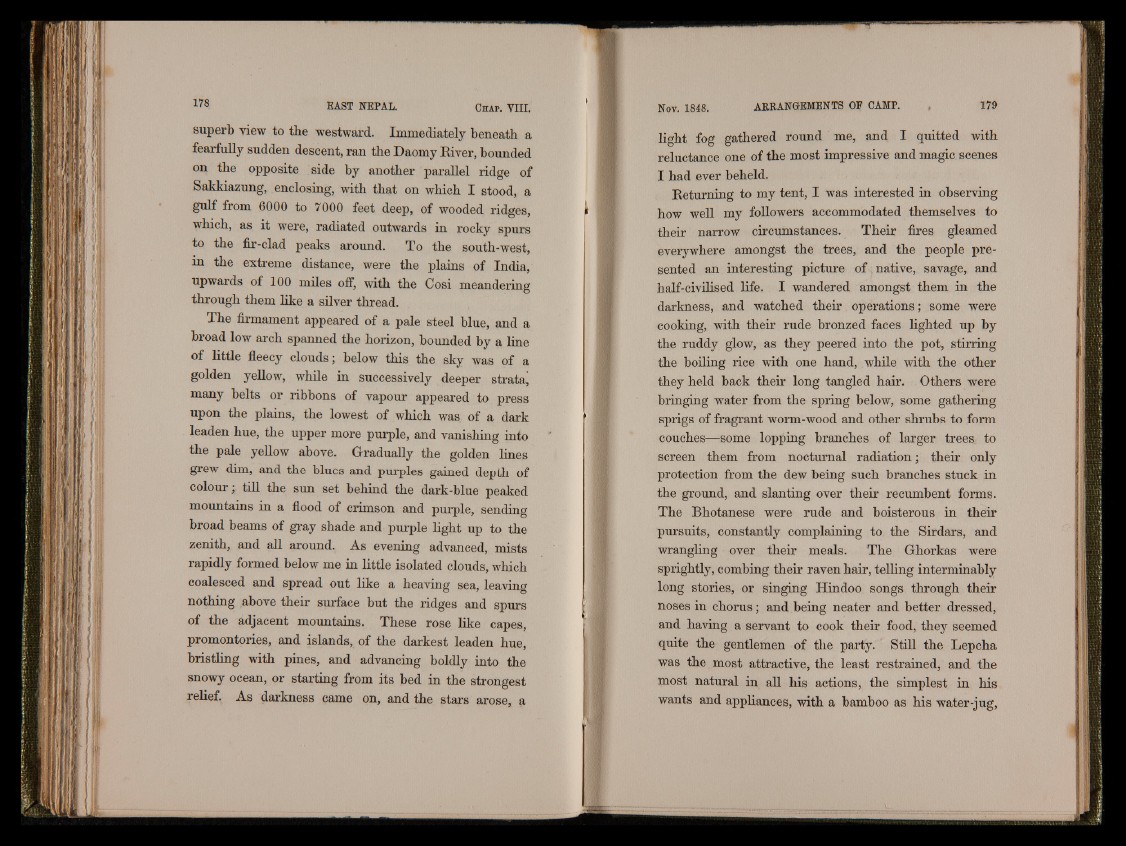
superb view to the westward. Immediately beneath a
fearfully sudden descent, ran the Daomy River, bounded
on the opposite side by another parallel ridge of
Sakkiazung, enclosing, with that on which I stood, a
gulf from 6000 to 7000 feet deep, of wooded ridges,
which, as it were, radiated outwards in rocky spurs
to the fir-clad peaks around. To the south-west,
in the extreme distance, were the plains of India,
upwards of 100 miles off, with the Cosi meandering
through them like a silver thread.
The firmament appeared of a pale steel blue, and a
broad low arch spanned the horizon, bounded by a line
of little fleecy clouds; below this the sky was of a
golden yellow, while in successively deeper strata,
many belts or ribbons of vapour appeared to press
upon the plains, the lowest of which was of a dark
leaden hue, the upper more purple, and vanishing into
the pale yellow above. Gradually the golden lines
grew dim, and the blues and purples gained depth of
colour \ till the sun set behind the dark-blue peaked
mountains in a flood of crimson and purple, sending
broad beams of gray shade and purple light up to the
zenith, and all around. As evening advanced, mists
rapidly formed below me in little isolated clouds, which
coalesced and spread out like a heaving sea, leaving
nothing above their surface but the ridges and spurs
of the adjacent mountains. These rose like capes,
promontories, and islands, of the darkest leaden hue,
bristling with pines, and advancing boldly into the
snowy ocean, or starting from its bed in the strongest
relief. As darkness came on, and the stars arose, a
light fog gathered round me, and I quitted with
reluctance one of the most impressive and magic scenes
I had ever beheld.
Returning to my tent, I was interested in observing
how well my followers accommodated themselves to
their narrow circumstances. Their fires gleamed
everywhere amongst the trees, and the people presented
an interesting picture of native, savage, and
half-civilised life. I wandered amongst them in the
darkness, and watched their operations; some were
cooking, with their rude bronzed faces lighted up by
the ruddy glow, as they peered into the pot, stirring
the boiling rice with one hand, while with the other
they held back their long tangled hair. Others were
bringing water from the spring below, some gathering
sprigs of fragrant worm-wood and other shrubs to form
couches—some lopping branches of larger trees to
screen them from nocturnal radiation; their only
protection from the dew being such branches stuck in
the ground, and slanting over their recumbent forms.
The Bhotanese were rude and boisterous in their
pursuits, constantly complaining to the Sirdars, and
wrangling over their meals. The Ghorkas were
sprightly, combing their raven hair, telling interminably
long stories, or singing Hindoo songs through their
noses in chorus; and being neater and better dressed,
and having a servant to cook their food, they seemed
quite the gentlemen of the party. Still the Lepcha
was the most attractive, the least restrained, and the
most natural in all his actions, the simplest in his
wants and appliances, with a bamboo as his water-jug,